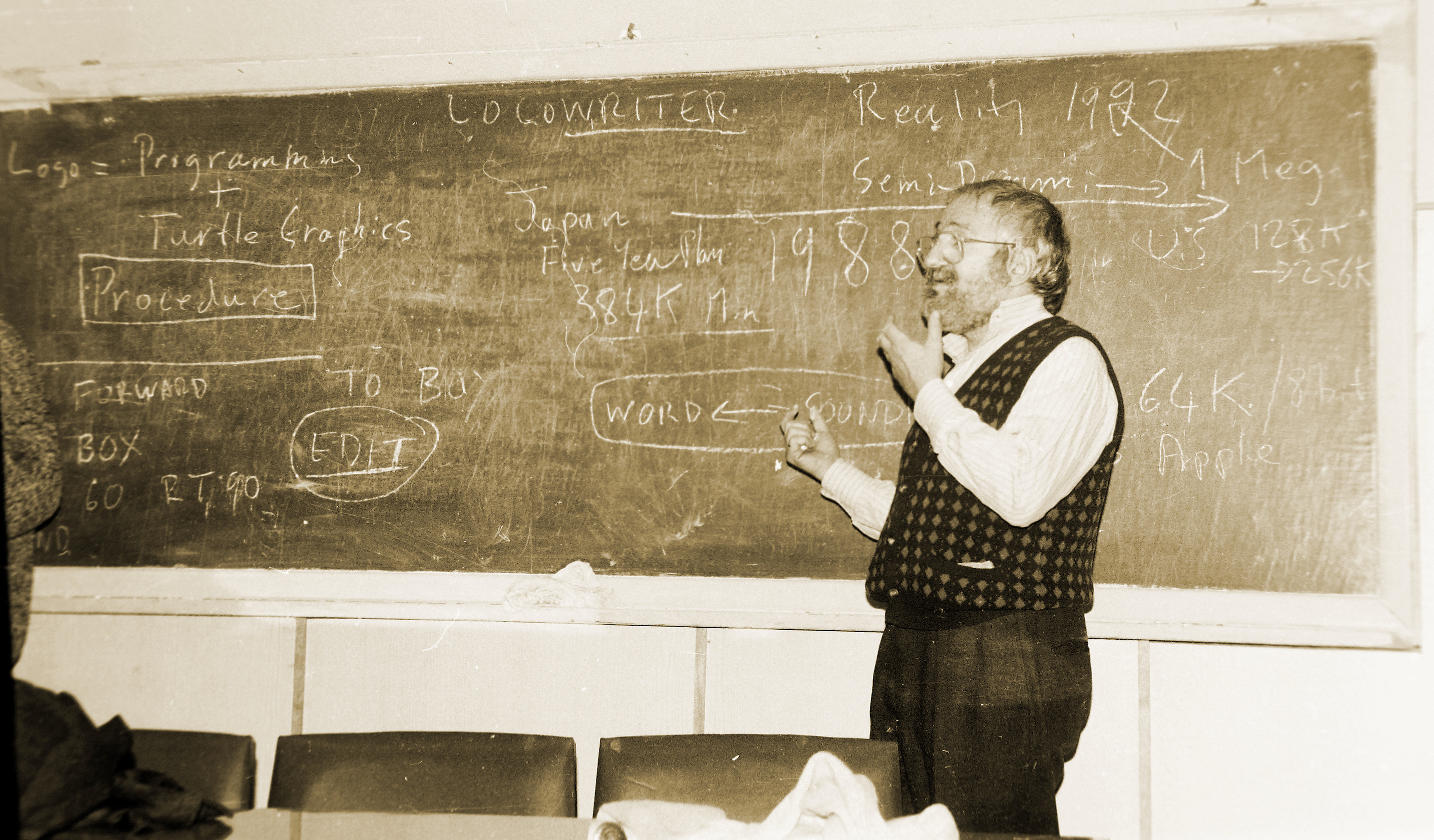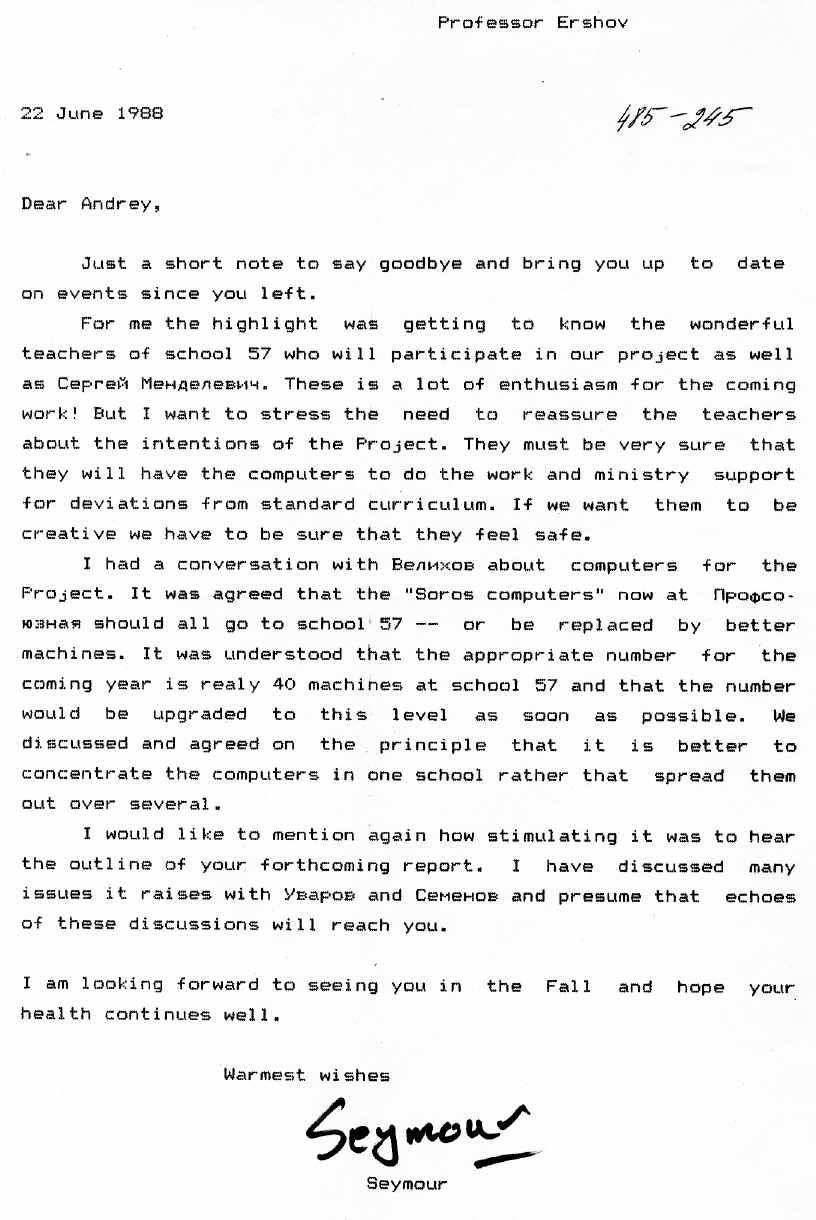Seymour Papert: “Computer as a condom”

Seymour Papert in Moscow at a meeting with members of the "temporary scientific and technical team SCHOOL", 1987
A discussion of laptops with local teachers reminded me of my meeting in Thailand with Mr. Condom. His real name is Michiei, but he proudly bears the nickname given to him for his work in teaching villagers from the suburbs to use condoms. Statistics show that he has made a significant contribution to maintaining birth control and the spread of sexually transmitted diseases. I remembered Kuhn Michai (Kuhn - Mr. Thai), because his method of teaching villagers how to use condoms can help us teach anyone anything. I personally learned a lesson from his words about “learning as a creative solution to problems”.
')
He explained his problem in the following way: if you, on a village meeting, stand up and say that you want to talk about something related to sex, pregnancy or condoms, your audience will evaporate within three minutes. What will you do? Someone may try to convey a message without using frightening village words. In my opinion, this would not only be ineffective, but also dishonest - and, as I have already said several times in this column, real education and deception are not combined. Michay's decision was as honest as it was witty: if you have only three minutes, find out how to use them as productively as possible! Therefore, he developed a three-minute program.
He gets up during the village meeting and asks directly: “Do you know what a condom is?” The tension grows faster and faster, while he pulls the condom package out of his pocket and opens it, saying: “Look, I will show you what can you do about it. " Then, when the drama of the situation reaches its limit, he brings the condom to his mouth and inflates it like a balloon. (I tried ... they can be inflated to an amazing size!) While everyone around is stupefied, he fastens it, pulls out a marker, draws a funny face on it and throws it into the crowd. It is the turn of another pack of condoms. He has several options for the same topic and pretty soon the audience starts to giggle.
As soon as laughter is heard, he says “thank you” and leaves. And that's it! If you return in a year, you will find that the lesson has an effect.
I compare this with the sex education lesson I attended at school. The teacher shows a drawing that demonstrates the human genital system and reads a lecture full of information about physiology. I could almost hear him in the head ticking “material” that should be “covered” during this lesson. Michaj did not teach anything like that. So can we call what he did, sex education? I will say yes ... He explained to these people something more important than dry facts that they probably knew or could know. He taught them to open their minds to objects that they had previously avoided. He showed that they can joke on a topic that previously tied their timid mind into a tight knot.
The Kuna Michai method can be used in a much larger number of topics, and not only in sex education in villages of Thailand. It is about opening the minds of people to study anything. Children whose minds resist memorizing fractions, grammar, or historical dates need something similar to what Michay gives to his pupils, rather than a carefully planned lesson full of facts presented in some curriculum.
What about laptops? My idea of using a computer has a lot to do with inflating a condom as a joke. It was not just a game, but a game with a goal. It reminds me of Debbie's fifth-grader, who participated in a pilot project that Dr. Edward Harel (who was my student at the time) spent at school in one of the most severe districts of Boston. Debbie hated math and resisted everything that had to do with her. Received the lowest scores for the tests. She learned programming because it allowed her to play with the words and poems she loved. As soon as she learned to write programs, she found a way to connect fractions with words and poetry. This led to Debbie allowing herself to think about these previously terrible things. And then to the general, but most of all - to her own surprise, her grade for the test on fractions was one of the highest.
Translation: Olya Mars
Still
"Neither mathematics nor man can be fully understood, being separated from each other."
- Seymour Papert
- 0 March. Seymour Papert and body programming training (and unconscious)
- Fundamentally Change the Way Kids Learn ( Seymour Papert: How the computer changed us and our children )
- Letter of Seymour Papert Yershov

- Seymour Papert " Mathematical Unconscious "

About #philtech
#philtech (technology + philanthropy) is an open, publicly described technology that aligns the standard of living of as many people as possible by creating transparent platforms for interaction and access to data and knowledge. And satisfying the principles of filteha:
1. Opened and replicable, not competitive proprietary.
2. Built on the principles of self-organization and horizontal interaction.
3. Sustainable and prospective-oriented, and not pursuing local benefits.
4. Built on [open] data, not traditions and beliefs.
5. Non-violent and non-manipulative.
6. Inclusive, and not working for one group of people at the expense of others.
Philtech's social technology startups accelerator is a program of intensive development of early-stage projects aimed at leveling access to information, resources and opportunities. The second stream: March – June 2018.
Chat in Telegram
A community of people developing filtech projects or simply interested in the topic of technologies for the social sector.
#philtech news
Telegram channel with news about projects in the #philtech ideology and links to useful materials.
Subscribe to the weekly newsletter
1. Opened and replicable, not competitive proprietary.
2. Built on the principles of self-organization and horizontal interaction.
3. Sustainable and prospective-oriented, and not pursuing local benefits.
4. Built on [open] data, not traditions and beliefs.
5. Non-violent and non-manipulative.
6. Inclusive, and not working for one group of people at the expense of others.
Philtech's social technology startups accelerator is a program of intensive development of early-stage projects aimed at leveling access to information, resources and opportunities. The second stream: March – June 2018.
Chat in Telegram
A community of people developing filtech projects or simply interested in the topic of technologies for the social sector.
#philtech news
Telegram channel with news about projects in the #philtech ideology and links to useful materials.
Subscribe to the weekly newsletter
Source: https://habr.com/ru/post/426667/
All Articles